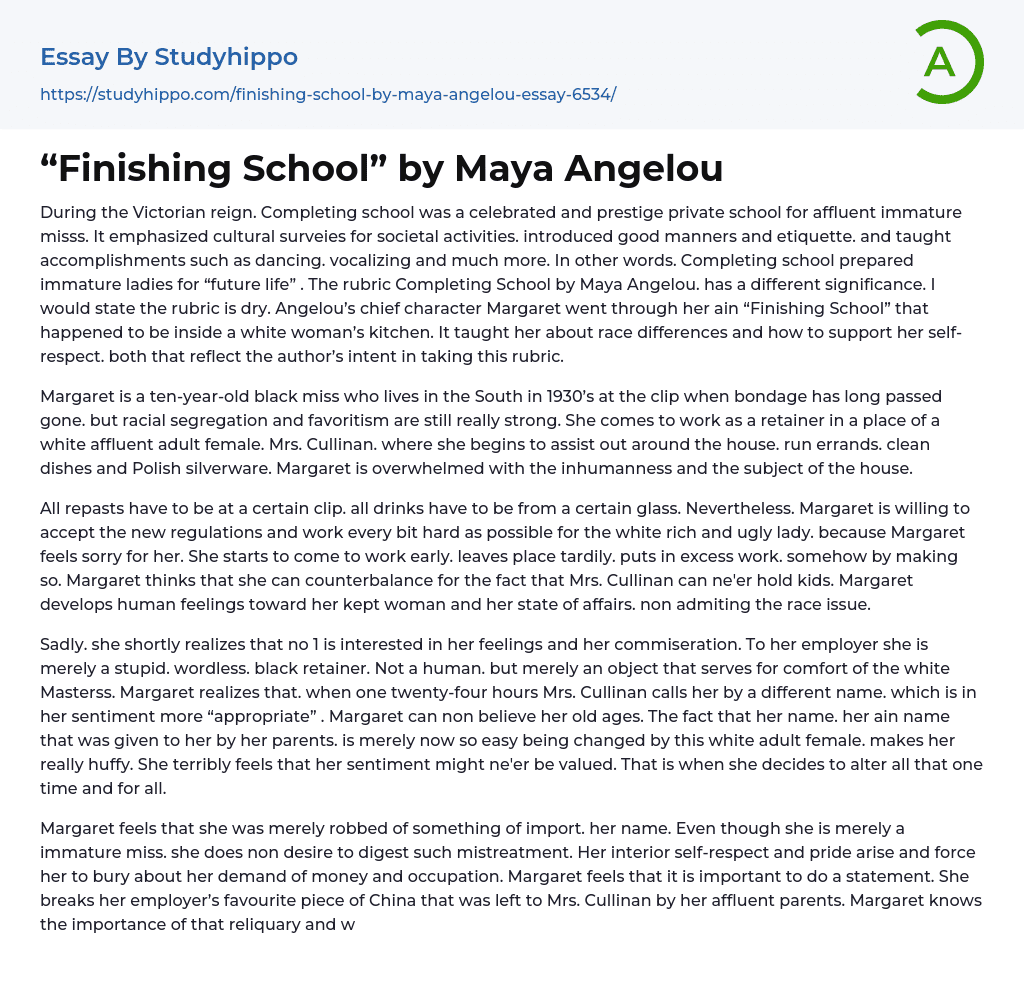During the Victorian reign. Completing school was a celebrated and prestige private school for affluent immature misss. It emphasized cultural surveies for societal activities. introduced good manners and etiquette. and taught accomplishments such as dancing. vocalizing and much more. In other words. Completing school prepared immature ladies for “future life” . The rubric Completing School by Maya Angelou. has a different significance. I would state the rubric is dry. Angelou’s chief character Margaret went through her ain “Finishing School” that happened to be inside a white woman’s kitchen. It taught her about race differences and how to support her self-respect. both that reflect the author’s intent in taking this rubric.
Margaret is a ten-year-old black miss who lives in the South in 1930’s at the clip when bondage has
...long passed gone. but racial segregation and favoritism are still really strong. She comes to work as a retainer in a place of a white affluent adult female. Mrs. Cullinan. where she begins to assist out around the house. run errands. clean dishes and Polish silverware. Margaret is overwhelmed with the inhumanness and the subject of the house.
All repasts have to be at a certain clip. all drinks have to be from a certain glass. Nevertheless. Margaret is willing to accept the new regulations and work every bit hard as possible for the white rich and ugly lady. because Margaret feels sorry for her. She starts to come to work early. leaves place tardily. puts in excess work. somehow by making so. Margaret thinks that she can counterbalance for the fact that Mrs. Cullinan can ne'er hold kids. Margaret develops human feelings toward her kept woman and
her state of affairs. non admiting the race issue.
Sadly. she shortly realizes that no 1 is interested in her feelings and her commiseration. To her employer she is merely a stupid. wordless. black retainer. Not a human. but merely an object that serves for comfort of the white Masterss. Margaret realizes that. when one twenty-four hours Mrs. Cullinan calls her by a different name. which is in her sentiment more “appropriate” . Margaret can non believe her old ages. The fact that her name. her ain name that was given to her by her parents. is merely now so easy being changed by this white adult female. makes her really huffy. She terribly feels that her sentiment might ne'er be valued. That is when she decides to alter all that one time and for all.
Margaret feels that she was merely robbed of something of import. her name. Even though she is merely a immature miss. she does non desire to digest such mistreatment. Her interior self-respect and pride arise and force her to bury about her demand of money and occupation. Margaret feels that it is important to do a statement. She breaks her employer’s favourite piece of China that was left to Mrs. Cullinan by her affluent parents. Margaret knows the importance of that reliquary and wants to take something of import from Mrs. Cullinan to acquire even.
The writer says “While white misss learned to waltz and sit gracefully with a tea cup balanced on their articulatio genuss. we were dawdling behind. larning the mid-Victorian values with really small money to indulge them…”
Mrs. Cullinan indulged her china piece meanwhile small Margaret had nil to
indulge but her self-respect. Through out Margaret’s experience in “Finishing School” she learns approximately race differences and self-respect. both values witch will function her in the hereafter.
- Aldous Huxley essays
- Alice Walker essays
- Amy tan essays
- Anne Bradstreet essays
- Anton Chekhov essays
- Arthur Miller essays
- Augustine essays
- Bertolt Brecht essays
- Booker T Washington essays
- Carol ann duffy essays
- Charles Dickens essays
- Charlotte Perkins Gilman essays
- Chinua Achebe essays
- Christina Rossetti essays
- Consider The Lobster essays
- Edgar Allan Poe essays
- Elizabeth Bishop essays
- Emily Dickinson essays
- Ernest Hemingway essays
- F. Scott Fitzgerald essays
- George Orwell essays
- Harper Lee essays
- Homer essays
- James Baldwin essays
- Jane Austen essays
- John Donne essays
- John Steinbeck essays
- Kate Chopin essays
- Kurt Vonnegut essays
- Langston Hughes essays
- Leonardo Da Vinci essays
- Mark Twain essays
- Mary Shelley essays
- Maya Angelou essays
- Nathaniel Hawthorne essays
- Oscar Wilde essays
- Percy Bysshe Shelley essays
- Peter Skrzynecki essays
- Phillis Wheatley essays
- Poets essays
- Ralph Waldo Emerson essays
- Ray Bradbury essays
- Richard Rodriguez essays
- Robert Browning essays
- Robert Frost essays
- Robert Louis Stevenson essays
- Seamus Heaney essays
- Sherman Alexie essays
- Sophocles essays
- Stephen King essays




